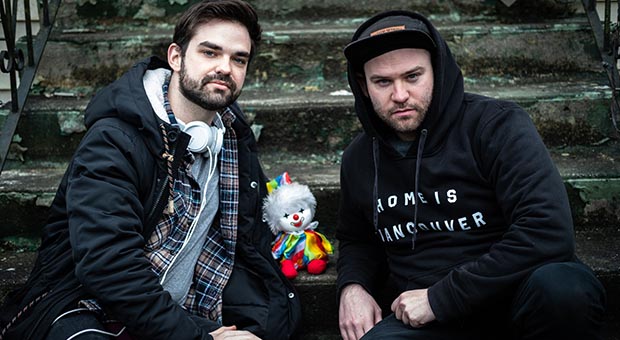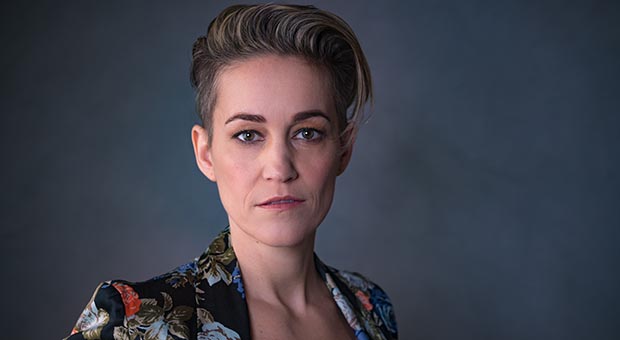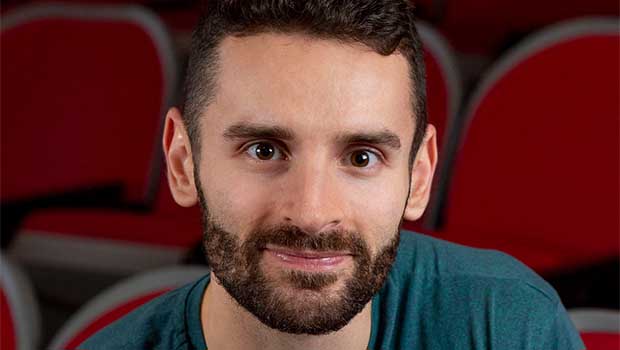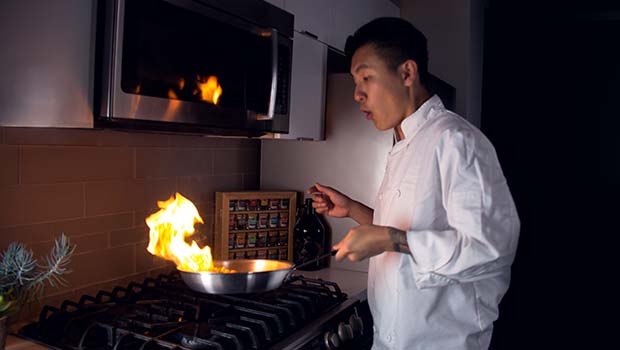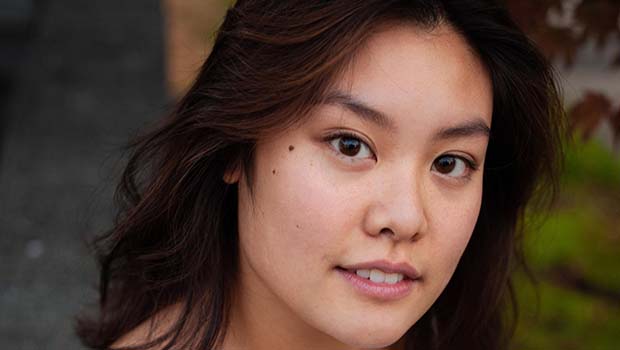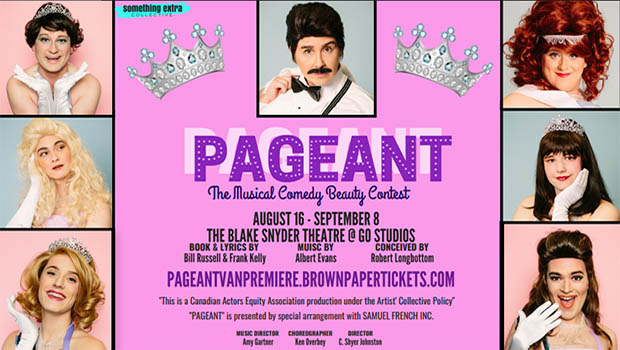
19 Aug “Pageant” Spotlight – Kelly-Ruth Mercier Interview
Something Extra Collective presents Pageant: The Musical Comedy Beauty Contest by Bill Russell and Frank Kelly. Music by Albert Evans. Conceived by Robert Longbottom.
Now on at The Blake Snyder Theatre at Go Studios in Vancouver until September 8th, Pageant lets you be the judge, no really: you might be the judge and choose the winner!
Pageant boldly pits six contestants – all played by male-identifying actors – in pursuit of the tiara and title, chosen by celebrity judges culled from the audience! The show’s cross-gender casting amplifies and satirizes the American notion of beauty pageants and this pageant is like nothing you’ve seen before! It’s a cheeky peek into what it is we never wanted to see in beauty contests.
The run will mark the Vancouver premiere of the show, featuring a diverse cast of industry
professionals and fresh faces from across North America.
Cast members include: Kelly-Ruth Mercier, Graeme Thompson, Max Hall, Simon Paterson, Javier Ricardo Sotres Porres, Kenneth Tynan, Ryan Purdy, Derry Oshust, and Creative Crew include: Amy Gartner, Ken Overbey, C. Shyer Johnston, Chris Lam, Ian Crowe, Kimmie Blais, Stellina Rusich, Jorge Louise Taracena, Demi Pedersen, Brendan Lowe, Tracy Cake, Natalee Fera, Victoria Bahnuk, Simone Boutin, Megan Sadler, and Jennifer Copping.
Kelly-Ruth Mercier spoke to us about Pageant!
________________________________

Can you start by telling us a little bit about your involvement with Pageant?
In the spring, I saw a casting call circulate for the show. I joined the cast of Cry-Baby last summer after a 15 year hiatus and, when I saw the call for Pageant, I threw my hat in the ring right away.
What should audiences expect from the show?
It’s a romp! This is true satire — it’s a one-act, and the show plows through every pageant cliche you can think of, from the impressive to the painful. I play the cheesy host who is, predictably, all about style and no substance. He’s very Love Boat-esque.
From your perspective, what is the most rewarding thing about stage acting?
This question is stumping me. But as I watch our show come together, I’m reminded of A Midwinter’s Tale – a marvellous film about a disparate group of people who stage Hamlet in a church, and against all odds. I’m struck anew about the compulsion that we – as artists – have: we are not comfortable in our own skin when not generating stories, when not participating in social discourse — even of the very silly kind. Our theatre collective is comprised of people who are participating for myriad reasons, and at personal cost. And yet: here we are. The too-popular misconception is that we seek reward (which is very welcome when it comes, mind you); rather, and for the most part, independent theatre and film are created by artists who live in discontent when not doing what they are meant to do. So… The rewarding thing?… Relaxing into the chaos of what must be.
What are the three most important ingredients for a successful theatre production?
There’s an old saying in the theatre: there are three actors: you, me, & them (referring to the audience). Regardless of the production value, or the quality of the show, or the marquee value of the title or anyone involved… There’s a group of people, however, small, who made a space in their lives to come and have a story told to them. This is as old as time, and I think of that every single time I’m associated with a piece of theatre. The members of the audience could have been anywhere else today, but they chose to come here. The most successful ingredients are a sincere desire, on the part of the playmakers, to share a story and an earnest desire, on the part of the audience, to be open to it. Most people can count on one hand — or maybe two — how many times they’ve seen a piece of theatre that has shaken them, and really stayed with them. But one of those experiences is worth 50 that are not; that is the power of theatre.
In your opinion, what is the current state of Canadian theatre and how has it evolved since you first got involved with acting?
I went to theatre school when people were just starting to buy VCRs. There were sincere discussions, in the ’80s, as to whether theatre was dying. Drum machines were in heavy use in popular music and we were also wondering if drummers were going to be extinct in the near future. But there is nothing like analog. There is no substitute for actual life. That truth will never leave live theatre, seeing a painting in person, live music, live… Anything. That said, audience members in the West are more accustomed to having a personal relationship with a story (because they can watch anything they want, alone, on a TV, computer, or phone) than was the case for all of human history before the 1960s: a play was attended by a group, however large or small, and the creation of stories inherently took the community in which the play was created into account. Jean Genet was not mindful of how often his plays would be produced in Canadian universities; he was speaking in the here and now of when he was creating a play, responding to the circumstances in which he lived, and for the people who could relate to them. Nowadays, there’s virtually no homogeny among Western audiences, and their shared cultural point of view is tenuous at best. Comedians have had more to say about this than anyone, as it’s becoming harder for them to do what they do without offending people so seriously that things blow up and negatively affect their careers. This may sometimes be the case in the theatre, but the point is that telling a story to a group of people tacitly relies on that group of people having some shared experience. That is why, in my opinion, mass-market stuff is derivative and un-challenging, and what “lowest common denominator” means. We can assume nothing of our audiences, henceforth. On the other hand, it’s the art-house stuff, independent theatre and film, and specialty channels / digital distribution that is more true to what theatre actually is: an audience member seeks it out, chooses it, takes it in. There’s far less discussion about what’s offensive, and much more room to have meaningful exchanges between storymakers and our larger communities.
________________________________
“Mean what you say; say what you mean; be a person of your word; and never forget that artists have their hands on the steering wheel of where a culture is headed… Drive carefully, and with care and respect.”
________________________________
What’s the most important lesson that you’ve learned as an actor?
Again, I don’t speak as an actor; I speak as a storyteller, who has as much experience in other disciplines as in acting. The most important lesson I have learned as a storyteller — as a person who has a voice (where “voice” doesn’t relate to sound but refers to “being heard”) — is about responsibility. Cultures ebb and floe over time, and this isn’t the first time in human history that those with the mic are not compelled by the responsibility they have to those who hear them. But, in my lifetime, these months and years might turn out to be the most clear, most terrifying proofs of the irresponsible, cavalier, and (perhaps) entirely self-centered use of “reach.” In contrast, it means a lot to me to put something out there and have it received — even if it’s not liked. Because I know how I’ve been impacted by a piece of theatre, or a song, or a poem, or a personal story — we all know it — and participating in the formation of a new thought, or new point of view or feeling in the mind and heart of another person, whether child or adult, is a huge, huge thing. I face this terrifying challenge every day, as a parent. Mean what you say; say what you mean; be a person of your word; and never forget that artists have their hands on the steering wheel of where a culture is headed… Drive carefully, and with care and respect …Even when doing some silly musical! It all matters.
What acting-related books and authors have been influential in your career so far?
#lesigh …Well, I suppose they all have. But I’m researching now, preparing to write just the kind of book that I’ve needed but could never find. And still… I always direct students to Uta Hagen, Michael Chekov, The Viewpoints… I could go on and on.
What other projects are you working on right now?
Parenting. The biggest, most engulfing, most important project of my life. As a solo-parent, working in theatre has become logistically impossible… But I’m trying to figure out if there’s a way to pull theatre back into the constellation of what’s out there for me and my kiddo.
Where can we find out more about you?
Facebook: Kelly-Ruth Mercier: Storyteller and Mercier Media Group
Twitter: @krmercier
Instagram: @krmercier17
Web: MercierMediaGroup.ca
________________________________
Thanks to Kelly-Ruth Mercier for speaking with us!
You can see Pageant until September 8th at The Blake Snyder Theatre at Go Studios.
For tickets, please visit PageantVanPremiere.BrownPaperTickets.com
________________________________


